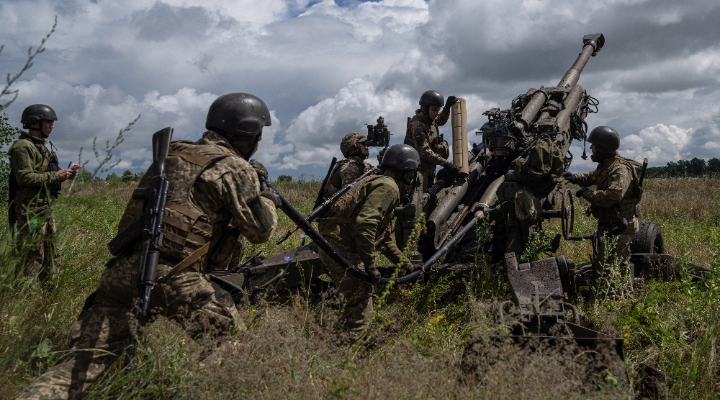Ruth Saldanha: Earlier this month, we saw an outbreak of war between Israel and Gaza. Investors might be forgiven for assuming this development would be a net positive for defence stocks. The reality, though, is the dots between military combat and defence contractor profits do not connect nearly as directly as they seem.
Why is this? Nicolas Owens is an industrial analyst for Morningstar. He covers the aerospace and defence sector, and he is here today to tell us what he thinks. Nic, thank you so much for being here today.
Nicolas Owens: Hi, Ruth. Thanks for having me.
Why War Does Not Always Equal Defence Profits
RS: So, let's start by talking about that link. Why is the link between military combat and defence contractor profits not as direct as many might think?
NO: Sure. Well, what investors seem to think is that war is good for defence stocks. We saw this on Monday, October 9, after the invasion of Israel from Gaza over the weekend and all the stocks on my list traded up 10% at the opening bell. I hear two theories investors seem to be following, both of which I would say are inaccurate but for different reasons.
The first is the idea combat or war will increase purchases of a weapon system or an ammunition and that must be good for the manufacturers. I'd say the disconnect here is that most of those things – the defence contractors make the money on the big weapon systems that are built over the long term, and these don't get purchased spur-of-the-moment. For an example, a month ago on September 4, Israel announced a $3 billion increase in its orders for F-35 jets going from 50 to 75 in their fleet. And that will be part of the contractors' revenue between 2027 and 2035. And basically, all the big contractors have a piece of the F-35 program for all intents and purposes. It's true that that ammunitions and missiles get used up in a conflict and they're more of a short-term order, but A, they're not a big piece of the defence contractors' revenue and B, they come out of stockpiles before any new orders are placed.
The second theory is more macro that when war breaks out, it means there's increased geopolitical risk and geopolitical risk tends to mean that governments will increase their defence spending and that defence spending should benefit the defence contractors. As far as that logic goes, it's sound, but the time to invest, I would say, is not when the war actually breaks out. The geopolitical risk ship sailed when Russia invaded Ukraine and a bunch of countries already started the process of increasing their military budgets years ago. There's an old saying, Ruth, if you want peace, prepare for war, and I would say you can view most of these defence contractors as being in the – outside of China, these are large publicly traded enterprises, they're in the business of preparing for war, which means designing and building the equipment that the military would use in a future potential conflict. When the actual fighting is happening, these companies aren't really heavily involved.
What Happened to Defence Stocks Since Ukraine?
RS: So, you mentioned the Russia-Ukraine conflict. Can you give us a sense of what happened after that conflict began and what impact it had on the stocks in your coverage universe?
NO: Sure. So, in February 2022, after occupying parts of Ukraine, since 2014, Russia launched an all-out invasion. And in that year, 2022, the aerospace and defence stocks were the best-performing industry in the industrial sector, beating the Morningstar US Market Index by 23%. So, similar reaction, let's say, from investors. We think this was fueled by lots of headlines about US and European funding and aid and shipments of some weapons systems to Ukraine. But the companies I cover weren't getting orders then.
Like I said, these come from stockpiles. The orders are coming in to rebuild, refill, but they come with strings attached, like having to restart an assembly line for a missile that the company had stopped making a decade ago or invest in capital and expanding its existing assembly line. So, it's not a direct boon, if you will.
Will Hamas-Israel Have a Similar Impact?
RS: Can we expect something similar in this conflict?
NO: Well enthusiasm-wise it seems so. Like I said, these stocks were up 10% on Monday morning and they've so far this week kept their gains. For the moment, this is a much smaller conflict than Ukraine and the companies I cover have fairly little exposure to Israel. So, even though 75 F-35 jets that we talked about, that's 3% of the total F-35 projected fleet, and they're already in my forecast.
RTX (RTX), which does have some resupply orders likely for the Israeli Iron Dome missile system, but it's a drop in the bucket for the $75 billion company. And that's really the thing. For a stock to go up 10% in the minute or in the morning where let's say all the short and medium range anti-missile systems, not just Israel's, are at most 10% of RTX's revenue. So, just kind of doing the math, the implication is that the market is saying that missile orders to RTX will double forever and that's just not realistic.
No Change to the Stocks Under Our Coverage
RS: So, what are any or all impacts on your ratings and valuations for the companies that you cover?
NO: None. My colleague, Loredana Muharremi, and I – she covers European airspace and defence. We agreed that this event does not – as shocking as it is, does not affect the moats of any of these companies, nor their risk or uncertainty. Our forecasts already have reflected things like F-35 program growth and munition resupply orders at increasing capacity, most of that on the back of changes from the Ukraine conflict.
Two Defence Contractor Stocks to Buy Right Now
RS: You mentioned that several of these stocks had a pretty decent run-up after the Ukraine conflict. Are any of them a buy right now?
NO: Well, they had a run-up and then they had a run-down and there's two stocks right now on my list that are 5-Stars. One is Huntington Ingalls (HII), which is the largest independent shipbuilder in the US. It built the USS Gerald Ford aircraft carrier, which you've seen in the news. And I would say it's kind of unaffected on a day-to-day basis. The ships are the longest cycle of these types of programs. So, a great example of how news flow is unlikely to affect this kind of a stock, but long-term cash flow and wide moat there. RTX is cheap today, mostly because of extreme market uncertainty about how costly the recall of their Pratt & Whitney Geared Turbofan engine will be. So, it's having a problem with its commercial aerospace business that's unrelated to Ukraine and unrelated to Israel. Both are Wide Moat and I'd say worth a look.
RS: Great. Thank you so much for joining us today with your perspectives, Nick.
NO: Thank you, Ruth.
RS: For Morningstar, I'm Ruth Saldanha.






























